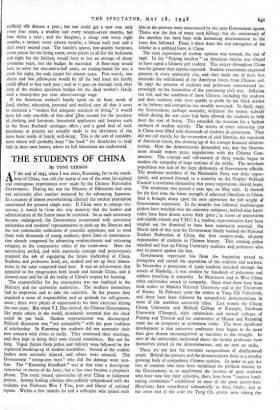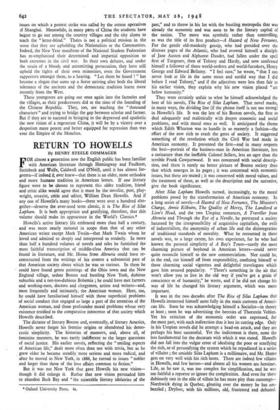THE STUDENTS OF CHINA
By TONY GIBSON
AT the end of 1945, when I was there, Kunming, far to the south- west of China, was still the centre of one of the most far-sighted and courageous experiments ever made by the Chinese Nationalist Government. During the war the Ministry of Education had seen one university after another menaced by the advancing Japanese. In a country of almost overwhelming illiteracy the student population constituted the greatest single asset. If China were to emerge vic- torious, it would be from this tiny minority that the leaders and administrators of the future must be recruited. So as each university became endangered, the Government co-operated with university authorities and students' representatives to pack up the libraries and the few ramshackle collections of scientific apparatus, and to send them with thousands of young students, down lines of communica- tion already congested by advancing reinforcements and retreating refugees, to the comparative safety of the south-west. Here the universities settled, and with enorm6u-s courage and perseverance resumed the job of equipping the future leadership of China. Students and professors lived, ate, studied and set up their labora- tories in the same congested mud huts. It was an achievement that appealed to the imagination both inside and outside China, and it showed once and for all the reality of China's respect for learning.
The responsibility for the evacuations was not confined to the Ministry and the university authorities. The students themselves had to improvise and to take the initiative. In the process they acquired a sense of responsibility and an aptitude for self-govern- ment; there were plenty of opportunities for their exercises during the war years. But when V.J. Day arrived, the Chinese Government, like many others in the world, mistakenly assumed that the clock could be put back. Student representation was discouraged.
Political discussion was "not compatible" with the pure tradition of scholarship. In Kunming the students did not surrender their new concern with civics so easily. They continued their meetings, and they kept in being their own elected committees. But not for long. Vague threats from police and military were followed by the organised breaking-up of student assemblies. Several of the student leaders were seriously injured, 'and others were arrested. The Government "strong-arm men" who did the damage went scot- free. The "Kunming bloodbath" was at that time a description somewhat in excess of the facts ; but it has since become a prophetic phrase. The event roused universities all over China to indignant protest. Among leading scholars who publicly sympathised with the students was Professor Wen I T'ou, poet and liberal of national repute. .Within a few months he and a colleague who joined with him in the protests were assassinated by the same Government agents. Theirs was the first of many such killings, but the anniversary of the murders has been kept with increasing determination in the years that followed. From it there dates the real emergence of the scholar as a political force in China.
The next expression of student opinion was towards the end of 1946. In the "Peiping incident" an American marine was alleged to have raped a Chinese girl student. The outcry throughout China was far greater than anyone expected. Student associations organised protests in every university city, and they made one of their first demands the withdrawal of the American forces from Chinese soil. In 1947 the protests of students and professors concentrated in- creasingly on the frustration of the continuing civil war. Inflation ran riot, and the condition of those Chinese, including the students and their teachers, who were unable to profit by the black market or by bribery and corruption has steadily worsened. In April, i947, the Government, perhaps unwisely, withdrew the money subsidy which during the war years had been allowed the students to help meet the cost of living. This provided the occasion for a further outburst of student activity. The streets of every university city in China were filled with thousands of students in procession. They did not call merely for the restoration of civil liberties, the expulsion of American forces, the cleaning up of the corrupt financial adminis- tration. Now the demonstrators demanded, too, that the Govern- ment should reopen peace negotiations with the Chinese Com- munists. The courage and self-control of these youths began to awaken the sympathy of large sections of the public. The merchant population was sick of the inept dishonesty of Government officials. The moderate members of the Nationalist Party saw their oppor- tunity, and pressed through to a majority on the Peoples' Political Council a resolution demanding that peace negotiations should begin.
The resolution was passed a year ago, on May 20th. It showed for the first time the latent strength of educated liberalism in China. And it brought down upon the new opposition the full weight of Government repression. In the months that followed machine-gun pickets have watched over the univerity campuses, barbed-wire barri- cades have been drawn across their gates ; in scores of universities and middle schools and Y.M.C.A.s, student representatives have been singled out for dismissal or have been summarily arrested. On March 29th of this year the Government finally banned the National Student Federation of China, the first country-wide, all-party organisation of students in Chinese history. That evening police attacked and beat up Peking University students and professors who met to protest against the ban.
Government repression has from the beginning served to strengthen and extend the opposition of the students and teachers. In November a procession of 2,000 students marched through the streets of Nanking ; it was swollen by hundreds of policemen and soldiers marching in sympathy. In Manchuria and in West China other universities struck in sympathy. Since then there have been food strikes in Mukden National University and in the University of Shensi. In February came the strikes at Tung Chi University, and these have been followed by sympathetic demonstrations in most of the northern university cities. Last month the Chung Cheng University and Medical College of Kwangsi, Szechuan University (Chengtu), eight universities and normal colleges of Peiping and Tientsin and the universities of Hunan and Kunming came out on temporary or permanent strike. The most significant development is that university professors have begun to do more than give distant encouragement as outsiders to the struggle. In nine of the universities mentioned above the faculty professors have themselves joined in the demonstrations, and are now on strike.
These are not just the transient exasperations of disillusioned youth. Behind the protests and the demonstrations there is a steadily growing body of sympathetic Chinese opinion. In order to pay the fees of students who have been victimised for political reasons by the Government, or to supplement the incomes of poor students who have now lost their subsidies, there have been "student fund- raising committees" established in most of the great universities.
Merchants have contributed substantially to these funds ; and at the other end of the scale the Tung Chi arrests were among the issues on which a protest strike was called by the cotton operatives pf Shanghai. Meanwhile, in many parts of China the students have begun to go out among the country villages and the city slums to teach the "letter-blind." Theirs is not a political mission in the sense that they are upholding the Nationalists or the Communists. Indeed, the New Year manifesto of the National Student Federation has re-emphasised their determined and impartial opposition to both extremes in the civil war. In their own debates, and under the strain of a bloody and unremitting persecution, they have still upheld the 'rights of their own minorities, even the Government supporters amongst them, to a hearing. "Let them be heard ! "has become a slogan that sums up a fierce striving after both the liberal tolerance of the ancients and the democratic tradition learnt more recently from the West.
These youngsters are going out once again into the factories and the villages, as their predecessors did at the time of the founding of the Chinese Republic. They, too, are teaching the "thousand characters" and trying to bridge the gap between scholar and farmer. But if they are to succeed in bringing to the depressed and apathetic the new vision of a regenerate China, it will be by a victory over a despotism more potent and better equipped for repression than was ever the Empire of the Manchus.































 Previous page
Previous page